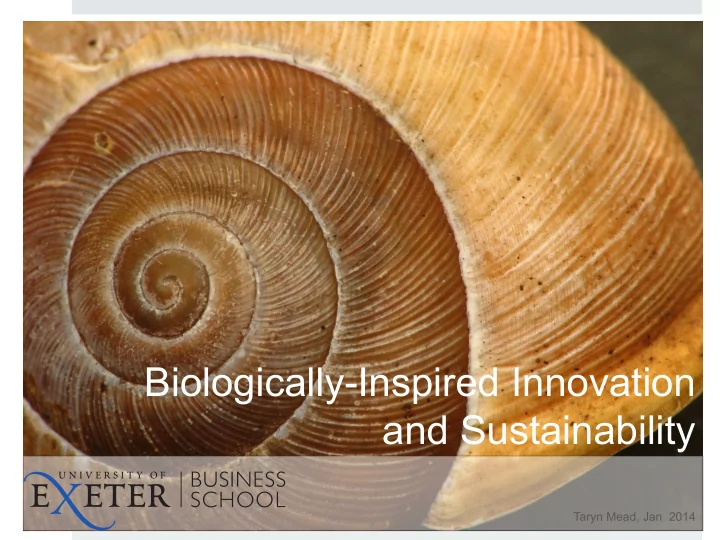

Biologically-Inspired Innovation and Sustainability Taryn Mead, Jan 2014
The Many Roles of a Biologist ¤ Field Biologist ¤ “Biologist at the Design Table” ¤ Biologist in the Business School Taryn Mead, Jan 2014
The State of Corporate Sustainability • Sustainability “journeys” to nowhere • Reaching the limits of eco-efficiency measures • Bumping up against pressures of free and subsidized markets • Difficulty with circular economy efforts • Management strategies and research absent of biophysical foundations Taryn Mead, Jan 2014
Changing Models of Sustainability Traditional Capitalism Business Society Nature -Classical capitalist economists A. Smith, etc. -Marcus, J. Kurucz, E. C. and Colbert, B. 2010. Conceptions of the Business-Society-Nature Interface: Implications for Management Scholarship . Business & Society. 49(3) 402-438. Taryn Mead, Jan 2014
Changing Models of Sustainability Triple Bottom Line (1998) Business Nature Society -Elkington, J. 1998 . Cannibals with Forks: The triple bottome line of 21 st century business . Capstone Publishing Ltd. Oxford. -Marcus, J. Kurucz, E. C. and Colbert, B. 2010. Conceptions of the Business-Society-Nature Interface: Implications for Taryn Mead, Jan 2014 Management Scholarship . Business & Society. 49(3) 402-438.
Changing Models of Sustainability Embedded View Nature (2010) Society Business Marcus, J. Kurucz, E. C. and Colbert, B. 2010. Conceptions of the Business-Society-Nature Interface: Implications for Management Scholarship . Business & Society. 49(3) 402-438. Taryn Mead, Jan 2014
Progressing BII for Sustainability – Oriented Innovation • BII initiatives need to be aligned with larger corporate sustainability agendas • A cohort of designers, engineers, architects, etc. who aim to understand biological systems • Transition from inventions to innovations • BII has matured enough as a discipline to transition to more robust analysis • Target participation in biophysical systems, not just emulation of them Taryn Mead, Jan 2014
A note on history of terms… Term (Year) Connection to Oldest to most recent Attributed To “Sustainability” Bionics (1958) Jack E. Steele No historically, but increasing Biomimetics (1969) Otto Schmidt No Biologically-Inspired Design (Early 1990s) Unknown Yes and No Biomimicry (1997) Janine Benyus Yes Ecomimicry (2007) Alan Marshall Yes Nature-Inspired Design Strategies (2010) Pauw, et al. Yes Biologically Informed Discipline (2014) Alena Iouguina Yes and No Pending Publication Others? Clarifications? Taryn Mead, Jan 2014
Are BIIs contributing to sustainable development? How do we know? • Systems Thinking • Life’s Principles • Material and Energy Efficiency • Ideality (TRIZ) • Life Cycle Analysis • Industrial Ecology • Planetary Boundaries • Green Chemistry Principles • Living Building Challenge Taryn Mead, Jan 2014
Levels of Specificity of Tools Material Systems Life’s Cradle to and Industrial Planetary Life Cycle Ideality Thinking Principles Cradle Energy Ecology Boundary Analysis Efficiency Taryn Mead, Jan 2014
Blended Scales of Analysis • Systems thinking vs. Reductionism (?) • Scientific method (reductionism) = dialogue of analysis + synthesis • The role of systems thinking is to frame this dialogue • Not mutually exclusive, rather dependent on one another Barton, J. and Haslett, T . Analysis , Synthesis , Systems Thinking and the Scientific Method : Rediscovering the Importance of Open Systems. Systems Research and Behavioral Science. Dec 2006. Vol 155. Taryn Mead, Jan 2014
Planetary Boundaries: Overview Convergence of Three Bodies of Research: 1. Ecological economics – “The scale of human action in relation to the capacity of the earth to sustain it.” 2. Earth’s processes including human activities 3. Combined with resilience theory, complex dynamics and self-regulation of living systems Rockstrom, J. 2009. A Safe Operating Space for Humanity . Nature Vol 461. 24 Sept 2009. Taryn Mead, Jan 2014
Planetary Boundaries (PBs) 1. Climate change (Exceeded) 2. Rate of Biodiversity Loss (Exceeded) 3. Nitrogen Cycle (Exceeded)/Phosphorous Cycle 4. Stratospheric Ozone Depletion 5. Ocean Acidification 6. Global Freshwater Use 7. Change in Land Use 8. Atmospheric Aerosol Loading (not yet quantified) 9. Chemical Pollution (not yet quantified) Rockstrom, J. 2009. A Safe Operating Space for Humanity . Nature Vol 461. 24 Sept 2009. Taryn Mead, Jan 2014
Reflections on PB • Not about going backwards in time • Cycles within boundaries • Humans as participants in biophysical cycles • Like any good science, it is rigorously debated Taryn Mead, Jan 2014
Applying PBs • Framework for cross-firm, cross-sector and cross- country analysis • Needs to be disaggregated and operationalized • The same lenses of analysis for corporate sustainability and for BIIs? Whiteman, G. Walker, B. and P. Perego (2013) Planetary Boundaries: Ecological Foundations for Corporate Sustainability. J. of Mgmt Studies. 50(2) 307-336. Taryn Mead, Jan 2014
Levels of BII Benyus, J. 1997. Biomimicry: Innovation Inspired by Nature. Harper Publishing. Taryn Mead, Jan 2014
Embedding BII for Sustainability Taryn Mead, Jan 2014
The Role of Analogues and Metaphors • Each has a role at different scales and with different users • Biological lenses = Function, Structures, Materials, Ecology, Principles, Big Theories • Applications within natural, design and social sciences • E.g., Organizational Ecology, Cybernetics, Ecosystem (My personal mission of disambiguation) Taryn Mead, Jan 2014
Units of analysis of BIIs for Sustainability When using BII as a tool for sustainability-oriented innovation, users need to consider multiple scales of analysis simultaneously. Taryn Mead, Jan 2014
Sustainability defined: A firm, innovation, etc. contributes to sustainable development when it creates equitable economic opportunities for human development by dynamically and resiliently participating in biophysical systems at local, bioregional and global scales in such a way that it improves societal relationships to planetary boundaries. Taryn Mead, Jan 2014
Implications for Further Research • Industry-specific measures of sustainability applied to development of new BIIs • More research directed at “Market Pull” scenarios • Innovation and other public policies that encourage BII at multiple levels • Using BII to solve BIG problems Taryn Mead, Jan 2014
“One has to make up his mind whether he wants simple answers to his questions – or useful ones…you cannot have both.” -J.A. Schumpeter Taryn Mead, Jan 2014
Contact Info Taryn Mead Innovation and Service Research Center University of Exeter, School of Business Exeter, UK T.l.mead@exeter.ac.uk Skype: tarynlmead
Recommend
More recommend